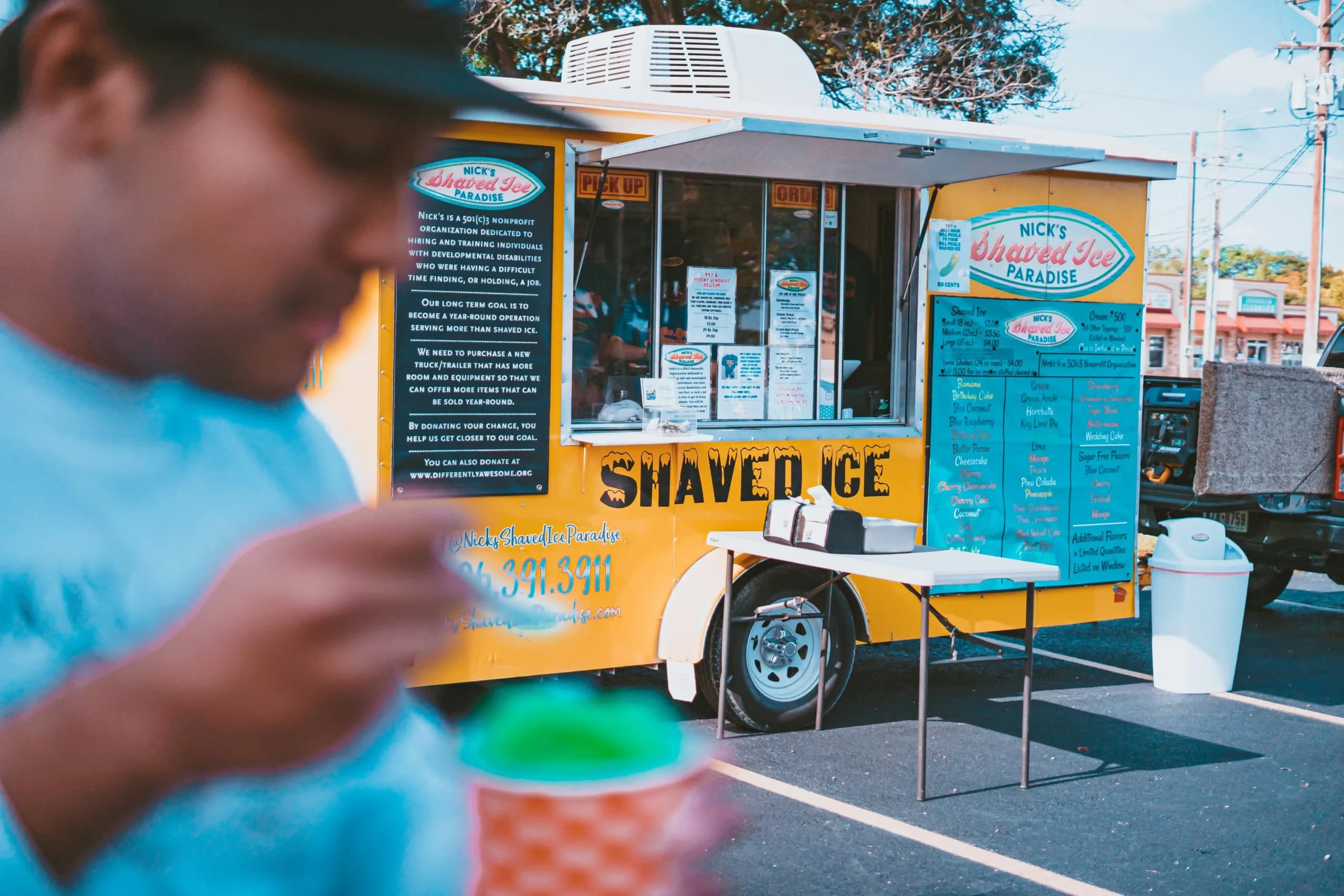If you’re planning to launch a mobile kitchen in Fort Wayne or Evansville, having the necessary food truck licenses in Indiana is the first step. These licenses cover everything from collecting sales tax to proving your truck meets health and fire safety standards. Once you have all the requirements, you’ll be ready to hit the streets and start serving delicious meals.
1. Business license
A business license is important for food trucks in any state. It shows the government that you’re running a legal business and are ready to report your earnings come tax time. In Indiana, business licenses are handled at the city or county level, not statewide, so the rules can vary depending on where you plan to operate. Some counties call it a “business tax certificate,” but it serves the same purpose.
The cost for a business license is usually around $25, but it can change based on your location and the type of food business you’re opening. If you want to operate in more than one city or county, you’ll likely need to apply for a separate license in each area. Check with your local city hall or county clerk’s office.
2. Retail merchant certificate (seller’s permit)
You’ll also need a retail merchant certificate, which serves as a seller’s permit. It gives you permission to collect sales tax from your customers and send it to the state. It’s required for any Indiana food truck selling taxable items like meals, snacks, or drinks.
The certificate is issued by the Indiana Department of Revenue and is free to apply for. In some cases, the state may ask for a small security deposit, especially for new businesses, just in case taxes go unpaid later on. You can apply quickly online through the in.gov portal, and once you’re approved, you’ll be able to collect and report sales tax properly.
3. Mobile food facility permit
Getting a mobile food facility permit proves that your food truck is safe for both your team and customers. It covers everything from how your food is stored and prepared to how you handle grease and trash. It also makes sure your equipment meets local health and safety standards.
To apply, you’ll need to submit several documents, including a commissary agreement (if you prep food off the truck), a floor plan showing your layout, a plumbing diagram, and a list of your cooking and refrigeration equipment. Your local health department will review all of this before approving your permit. The cost is usually around $150 per year, but this can change depending on your county.
The good news? Indiana is phasing in a new statewide permit system. Thanks to House Enrolled Act 1577, starting in 2027, you’ll be able to operate anywhere in the state with one permit. That means no more applying in every county. The fee will be capped at $450, saving you time and money as you grow.
4. Public health permit
A public health permit is issued after your truck passes a health inspection, confirming you meet local food safety standards. Until Indiana’s statewide permit system rolls out in 2027, you’ll need a separate permit for each county you plan to operate in.
The health inspection will check that your truck has a working handwashing sink, a 3-compartment sink for washing dishes, safe food storage and prep areas, and proper systems for waste and grease disposal. If anything is missing or not up to code, you’ll need to fix it before you can open.
Fees for this permit vary from around $100 to over $1,000, based on your county and how much food prep you’re doing on board. If you’re only selling prepackaged food, your operation is considered lower risk, which could mean a lower fee. It’s worth checking with your local health department to understand the exact requirements and cost in your area.
5. Food handler’s permit
The food handler’s permit, also called a health permit or ServSafe Certificate. Every team member who handles food must get certified within 30 days of being hired. The test covers basic food safety practices, and employees need to score at least 70% to pass. The cost is up to $15 per person. Managers who already have a Food Protection Manager Certification may be exempt.
6. Certified Food Protection Manager (CFPM)
Some counties, like Vanderburgh and Marion, require the owner or person-in-charge to have a Certified Food Protection Manager (CFPM) on staff. This shows your team has someone who understands advanced food safety practices. You have six months from opening to complete this certification, and it must be from an ANSI-accredited program like ServSafe Manager. Even if it’s not required in your county, having it is a smart move for training and compliance.
7. Fire safety compliance
If your truck cooks food on board, you’ll need to meet fire safety requirements. This usually means passing a fire inspection before opening, and sometimes every year after. You’ll need to have a Class K extinguisher for grease fires, a standard ABC extinguisher, and, if you use fryers or grills, a Type I hood and automatic suppression system. All fire safety gear must be tagged and up to date, typically within the past 12 months.
Indiana license renewals to remember
Indiana is finally making it easier for food trucks to operate across the state. For years, food truck owners had to juggle a messy patchwork of local rules, fees, and permits just to serve in more than one county.
While the licensing process is getting simpler, it’s still important to stay on top of renewal dates for your permits and certifications. Missing a renewal can lead to fines or temporary shutdowns. Keeping a clear, easy-to-read checklist or table of deadlines can help your team stay organized and avoid costly mistakes.
| Permit or requirement | Who issues it | Renewal timeline | Notes |
| Business license | Local city or county clerk’s office | Annually (varies by jurisdiction) | Usually costs around $25. Some counties call it a “business tax certificate.” |
| Retail merchant certificate (seller’s permit) | Indiana Department of Revenue | No renewal (update if info changes) | Free to apply. |
| Mobile food facility permit | Local health department (until 2027); statewide license after 2027 | Annually | Costs around $150/year. From 2027, one statewide license capped at $450 will replace county permits. |
| Public health permit | Local health department | Annually | Fees range from $100–$1,000+ depending on county and risk level. |
| Food handler’s permit | Local health department or accredited provider (e.g., ServSafe) | Typically every 2–3 years (varies) | Cost up to $15 per person. Required for every employee within 30 days of hire. |
| Certified Food Protection Manager (CFPM) | ANSI-accredited programs (e.g., ServSafe Manager) | Every 5 years | Required in some counties like Vanderburgh and Marion. Must be completed within 6 months of opening. |
| Fire safety compliance | Local fire department | Annually or biannually | Required if cooking onboard. |
Kick off your food truck journey the right way
Launching a food truck is a big step, but with the right Indiana licenses and permits, you’ll be set up for long-term success. Each one is there to protect your team and your customers. Start your business off on the right foot by staying compliant to avoid stress later.
Keeping track of expiry dates and renewals is just one part of running a mobile business. It’s easy to miss a deadline when you’re busy serving guests. Make managing your food truck easier with 7shifts, an all-in-one restaurant management software that simplifies scheduling, task management, payroll, and record-keeping. This way, you’ll be free to focus on building loyal customers and new opportunities.

Rebecca Hebert, Sales Development Representative
Rebecca Hebert
Sales Development Representative
Rebecca Hebert is a former restaurant industry professional with nearly 20 years of hands-on experience leading teams in fast-paced hospitality environments. Rebecca brings that firsthand knowledge to the tech side of the industry, helping restaurants streamline their operations with purpose-built workforce management solutions. As an active contributor to expansion efforts, she’s passionate about empowering restaurateurs with tools that genuinely support their day-to-day operations.
